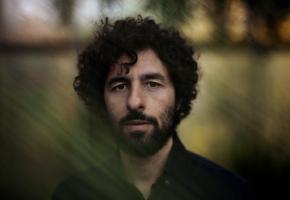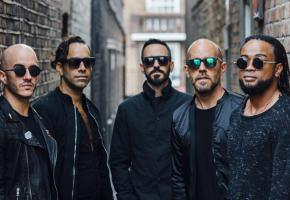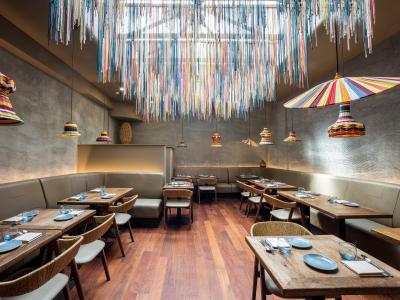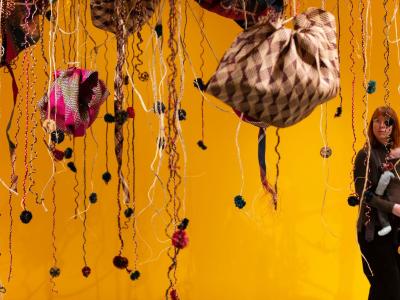Born in Bogotá, Colombia, music was an important part of Simón Mejía’s life from a young age. "My mother recognised that I had a big interest, and I began taking piano lessons when I was a child, and then guitar."
As a teenager, Simón goes on, "I was in many bands of various genres, hard rock, metal, but then I discovered electronic music and I started creating techno and house music."
It was 2001 and, absorbing influences from New York, London and Berlin, Simón decided he needed to put his own stamp on the music he was making, “an identity and uniqueness,” as he calls it. “I started to explore Colombian folk rhythms and discovered that they shared a common root because they are both dance music. We combined the two and Bomba Estereo was born out of a restlessness to find electronic music that would express ourselves as Colombians without simply copying."
And then Simón met Lilliana Samuet at a concert. “I was looking for a singer for Bomba and had a few candidates lined up. Then I saw her singing with another band. And I thought, wow, she’s the one. I invited her to the studio. We did a few songs, and then we started working together and haven't stopped. We became Bomba, with lyrics written by Lilliana and music by me. Almost 15 years up to the present."
Releasing their first album, Vol 1, in 2006, and their second, Estalla, in 2008, which included the song Fuego, their first international hit, Bomba Estereo began performing in smaller, then larger venues, then international festivals and were soon collaborating with the likes of Will Smith and performing at the Grammys. How did he receive the new fame?
“You know it is a bit bizarre,” Simón responds. “Sometimes I am very surprised about it. Everything has happened in a very organic way, with bit of luck mixed in. We were moving up in the music industry and started playing in bigger venues, but never in our lives did Liliane or I expect this. We didn't imagine what Bomba would become.”
Bomba Estereo grew as Latin American rock and pop fans of the post-Soda Stereo generation searched for something new. Its experimenting with cumbia and other rhythms proved attractive to audiences who wanted a more earthy sound, away from commercial Latin pop. Crucially, it struck a chord with European and US audiences, for whom the electronic treatment rendered complex afro-Colombian rhythms accessible.
“Gringos and Europeans were able to dance to it without knowing how to dance salsa for example. So, I believe that was it,” Simon admits. “Apart from that, the lyrics have a message. It's not just for dancing, there's something else."
Details such as the whistle in To My Love, made everyone intrigued, including Will Smith. "He reached out to us and said he wanted to sing with us, and the record label was super happy,” laughs Simón.
To My Love became a mainstream hit with more than 200 million plays on Spotify. “The song had been out there for a while and one day the record label called and said: look at this and we were like ‘wow when did this happen?’ It grew and grew. It is normal for a record label to release a single and invest heavily in it, putting it on the radio and promoting it. But in Spotify, it was the other way around; it was the public. The other surprise was when the Soy yo video and the girl in it became a symbol for Latinos in the United States opposing Trump's campaign, which was fantastic.”
But, for all the fame and travelling, the band are well and truly rooted in Colombia, more so since the pandemic, which Simón says has brought home the values of what he loves about his country. “Colombia is very complicated. It is so beautiful, so wonderful and so musical. And yet we have been at war all our lives, so magical and yet so violent.”
The environment takes centre stage in Bomba’s latest album Deja. “We were already done recording the album, but the pandemic put everything into consideration, especially the environment and the connection that we have lost with the earth, with ourselves and with other human beings. The album talks about the quest of trying to reconnect with the basic substances of life, the elements of nature which, thanks to them we exist on this planet.”
The album also focuses on the most human of things: feelings. “It has been something we have always talk about in our albums, love, heartbreaks, loneliness. In Deja, depression is a big theme, how it can prevent us from connecting with the most essential things, water, air, love, the things we need to live. It sounds clichéd but sometimes we forget that love is a way to feel better, to save ourselves.”
You can see Simón’s anguish at how, with all the opportunities the pandemic gave us, to reflect and take time, our leaders have not taken the same opportunity, “We aren’t fully out of the pandemic and there is a war going on already. Things are getting harder, darker. And we said wow, it’s to release this album, which has something to say. Because sometimes I feel that mainstream music doesn’t say much these days. I would love to see music go back to being used as a tool of change.”
Indeed, when he’s not working on music, Simón is totally engrossed in his passion for the environment. In 2020 he released Sonic Forest, a documentary he co-created with Stand Trees and Joaquin Phoenix, on the conservation of Colombia's tropical forests on the Pacific coast. “It was a lovely project and it opened doors for us to continue making this type of content that talks about music and the environment in Colombia.”
Currently, Simón is crowdfunding to produce another documentary about one of Colombia's most important rivers, the Magdalena River, which runs across the country, and faces grave threats as a result of contamination. The area around is also the birthplace of cumbia. “It is about the music as well, because this music is connected to our environment,” Simon explains.
The song Tierra, on his latest album, was inspired by the music of Colombia’s Pacific coast. “Before, we were very influenced by Caribbean music, like cumbia and champeta. But the music in the Pacific is completely different, in another metric, in four quarters, and has the marimba, an instrument unique to that music. I developed a strong connection to it. It is a contradiction that the most beautiful places in Colombia, which produces the most beautiful music, are also the most violent.”
It will be quite a leap from Colombian jungle to the European festiva circuit this summer but Simon is appreciative of the debt Bomba owes to the European hipster festival circuit.
“To begin with, they do festivals in incredible locations. I like the Germans ones, they purposely do them in places that were significant in the war, in the darkest times and have given them new meaning. Festivals like Fusion in North-East Germany or Roskilde in Denmark helped build our careers.”
So what can the British public expect from Bomba's performance at Somerset House?
"It has a unique visual setting that we've worked hard to create, and it’s very connected to the environment and the vision of the new album. We've brought in new members to the band, and we've even added backing vocalists to the show. We hope people connect with these new songs. This album has an important meaning for us and we want people to feel it too.”
Bomba Estereo will be performing at Somerset House in London on July 10 2022
















